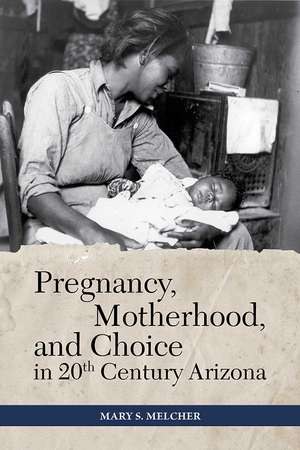Pregnancy, Motherhood, and Choice in Twentieth-Century Arizona: Women's Western Voices
Autor Mary S. Melcheren Limba Engleză Hardback – 20 sep 2012
Early twentieth-century Arizona was a life-threatening place for new and expectant mothers. Towns were small and very far apart, and the weather and harsh landscape often delayed midwives. It was not uncommon for a woman to give birth without medical care and with the aid of only family members. By the 1920s, Arizona was at the top of the list for the highest number of infant deaths.
Mary Melcher’s Pregnancy, Motherhood, and Choice in Twentieth-Century Arizona provides a deep and diverse history of the dramatic changes in childbirth, birth control, infant mortality, and abortion over the course of the last century. Using oral histories, memoirs, newspaper accounts, government documents, letters, photos, and biographical collections, this fine-grained study of women’s reproductive health places the voices of real women at the forefront of the narrative, providing a personal view into some of the most intense experiences of their lives.
Tackling difficult issues such as disparities in reproductive health care based on race and class, abortion, and birth control, this book seeks to change the way the world looks at women’s health. An essential read for both historians and public health officials, this book reveals that many of the choices and challenges that women once faced remain even today.
Mary Melcher’s Pregnancy, Motherhood, and Choice in Twentieth-Century Arizona provides a deep and diverse history of the dramatic changes in childbirth, birth control, infant mortality, and abortion over the course of the last century. Using oral histories, memoirs, newspaper accounts, government documents, letters, photos, and biographical collections, this fine-grained study of women’s reproductive health places the voices of real women at the forefront of the narrative, providing a personal view into some of the most intense experiences of their lives.
Tackling difficult issues such as disparities in reproductive health care based on race and class, abortion, and birth control, this book seeks to change the way the world looks at women’s health. An essential read for both historians and public health officials, this book reveals that many of the choices and challenges that women once faced remain even today.
Preț: 344.12 lei
Preț vechi: 467.87 lei
-26% Nou
Puncte Express: 516
Preț estimativ în valută:
65.85€ • 68.98$ • 54.57£
65.85€ • 68.98$ • 54.57£
Carte indisponibilă temporar
Doresc să fiu notificat când acest titlu va fi disponibil:
Se trimite...
Preluare comenzi: 021 569.72.76
Specificații
ISBN-13: 9780816528462
ISBN-10: 0816528462
Pagini: 264
Ilustrații: 9 b-w photos, 7 tables
Dimensiuni: 152 x 229 x 43 mm
Greutate: 0.45 kg
Ediția:First Edition
Editura: University of Arizona Press
Colecția University of Arizona Press
Seria Women's Western Voices
ISBN-10: 0816528462
Pagini: 264
Ilustrații: 9 b-w photos, 7 tables
Dimensiuni: 152 x 229 x 43 mm
Greutate: 0.45 kg
Ediția:First Edition
Editura: University of Arizona Press
Colecția University of Arizona Press
Seria Women's Western Voices
Notă biografică
Mary S. Melcher is a public historian and consultant who has worked on public history projects all over Arizona, including the Arizona Women’s Heritage Trail. She is the author of numerous articles and the winner of the Susanne Shafer Award for outstanding contributions in women’s studies in Arizona.
Extras
“Women’s stories of their experiences in childbirth, their struggles to care for their babies, and their attitudes, beliefs, and experiences related to fertility control are a vital part of our past. By examining the experiences of those who came before, in Arizona and the Southwest, we learn how geography, income level, ethnicity, culture, and laws have affected this area of life, providing greater knowledge of women’s lives in this place and time and more understanding of how to move forward into the future.” —Mary S. Melcher, from the conclusion
Cuprins
Illustrations
Acknowledgments
Introduction
1 “You’re My Miracle”: Babies, Birth Rates, and Health Care, 1910– 1940
2 Saving the Babies: Lowering Infant Mortality in the Southwest
3 Margaret Sanger and the Arizona Birth Control Movement
4 “Tis a Sobering Experience”: Providing Contraceptives for the Rural and Urban Poor
5 Battling Poverty and Isolation to Improve Mothers’ and Infants’ Health
6 “Rhythm Babies,” Birth Control, and Planned Parenthood: Years of Growth and Change
7 Arizona and Abortion Reform: Conflict without Resolution
8 Providing Reproductive Health Care in a New, More Politicized Era
9 Pregnancy and Choice: Reproductive Health in Twentieth-Century Arizona
Notes
Bibliography
Index
Acknowledgments
Introduction
1 “You’re My Miracle”: Babies, Birth Rates, and Health Care, 1910– 1940
2 Saving the Babies: Lowering Infant Mortality in the Southwest
3 Margaret Sanger and the Arizona Birth Control Movement
4 “Tis a Sobering Experience”: Providing Contraceptives for the Rural and Urban Poor
5 Battling Poverty and Isolation to Improve Mothers’ and Infants’ Health
6 “Rhythm Babies,” Birth Control, and Planned Parenthood: Years of Growth and Change
7 Arizona and Abortion Reform: Conflict without Resolution
8 Providing Reproductive Health Care in a New, More Politicized Era
9 Pregnancy and Choice: Reproductive Health in Twentieth-Century Arizona
Notes
Bibliography
Index
Recenzii
"This impresseivly researched and well-written book reveals a most fundamental yet rarely recorded part of human life. Public historian Melcher uses oral histories among other sources to examine what it was like to give birth and control fertility in the southwestern US during the 20th century."—CHOICE
"Melcher's timely book provides cultural and environmental context to an issue too often interpreted only through legal and political lenses."—Journal of Arizona History
Descriere
Mary Melcher’s Pregnancy, Motherhood, and Choice in Twentieth-Century Arizona provides a deep and diverse history of the dramatic changes in childbirth, birth control, infant mortality, and abortion over the course of the last century. Using oral histories, memoirs, newspaper accounts, government documents, letters, photos, and biographical collections, this fine-grained study of women’s reproductive health places the voices of real women at the forefront of the narrative, providing a personal view into some of the most intense experiences of their lives.

